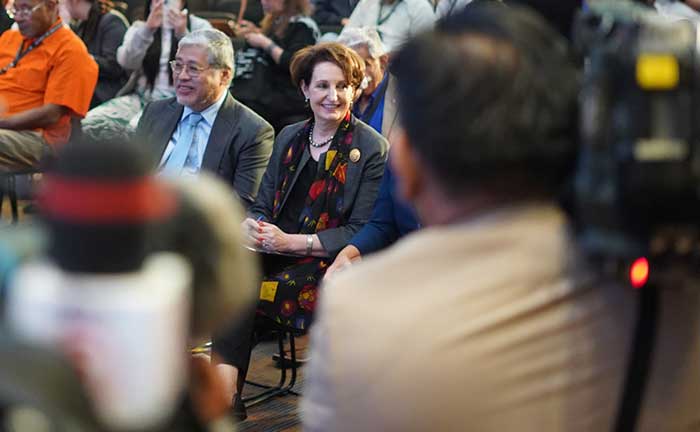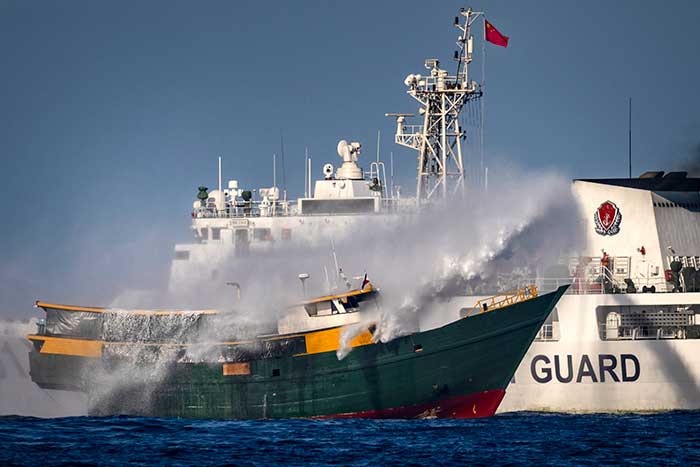By Francis Allan L. Angelo
In a crucial meeting at the East-West Center International Media Conference in Manila on Wednesday, Philippines Foreign Secretary Enrique Manalo and US Ambassador to the Philippines MaryKay Carlson underscored the enduring partnership between the Philippines and the United States while emphasizing their dedication to press freedom amidst rising disinformation.
The two diplomats discussed the ongoing disputes in the West Philippine Sea, addressing concerns over false narratives perpetuated by malign actors, particularly China.
Press Freedom Under Siege
“This gathering could not have come at a more crucial time,” stated Secretary Manalo, addressing over 350 journalists from around 30 countries.
He highlighted the rampant disinformation campaigns targeting the Philippines, noting, “The ability of the press to report on global events and the ability of people to appreciate and understand these events is under sustained attack from disinformation and cyberattacks. Many countries, including the Philippines, have been targeted by malign actors, wantonly exploiting technology to distort and manipulate facts.”
Despite the Philippines ranking low on the global Press Freedom Index due to issues such as online harassment and violence against journalists, Manalo affirmed the Marcos government’s commitment to collaborating with the media.
“Our friends in the media have been able to report on these developments freely, without force and intimidation from government,” he said, underscoring the importance of a free press in maintaining a rules-based international order and protecting sovereign rights in the West Philippine Sea.
U.S. Support and Shared Challenges
Ambassador Carlson echoed these sentiments, stressing the critical role of journalists in covering significant global events.
“As journalists, you are on the front lines covering conflicts and crises, elections, and important global meetings. Your reporting is essential for us to understand when our strategy is working, when it isn’t, and how we need to adjust,” Carlson said.
Acknowledging the shared challenges in press freedom, Carlson pointed out that even in the US, the Press Freedom Index has been declining.
“There are pockets everywhere, including in our own country, where we can’t say that freedom of the press is always on a perfect trajectory. We see journalists being harassed in our own country.”
Dispute Over the West Philippine Sea
Addressing the ongoing maritime disputes, Carlson supported Manalo’s remarks on the “false narrative” that portrays the Philippines as a mere pawn in a great-power rivalry between the US and China.
This oversimplification obscures the real issue: China’s disregard for international law and its impact on the legitimate rights of coastal states like the Philippines.
“We heard Secretary Manalo say that the Philippines has an agenda that stands on its own. And, as our partner, we support that they are not a pawn in a great-power game,” Carlson asserted.
She emphasized the strategic importance of the Philippines and the US-Philippines alliance, particularly in addressing challenges posed by climate change and regional security.
Carlson pointed out that the US is home to about 4.5 million Filipino-Americans, and that some 700,000 Americans live in the Philippines—more than the resident American populations in Japan and Korea combined, two other key US allies in Asia.
“So those close connections animate the US-Philippine relationship in a way that is very significant and would be the case no matter what big nations are doing in the region,” she said.
Reaffirming the US stance, Carlson declared, “We are urging the PRC to cease harassment of Philippine vessels lawfully operating in the Philippine Exclusive Economic Zone; to halt its disruption of states’ sovereign rights to explore, utilize, conserve, and manage natural resources in their own EEZs; and to end interference with the freedoms of navigation and overflight of all states’ lawful operation, not only in this region, but around the world.”


















